
How to Write a Water Utility Proposal: Tips and Guidelines
Do you need to know how to write a water utility proposal? This guide covers essential steps, from understanding your stakeholders to ensuring regulatory compliance. Follow these guidelines to write a winning proposal.
Key Takeaways
- Water utility proposals are essential for advocating clean water initiatives and addressing supply and wastewater management.
- Successful proposals require a thorough understanding of RFP requirements, stakeholder engagement, and a clear presentation of project objectives and budgets.
- Tools like Proposal Kit can enhance the proposal writing process, providing customizable templates, automated quoting, and resource management features.
Understanding Water Utility Proposals

Water utility proposals are a subset of contracting and construction proposals specifically designed to advocate for clean water initiatives that ensure the availability and quality of water resources. These proposals are crucial in the water sector, addressing water supply and wastewater management issues.
In addition to addressing water supply and wastewater management, water utility proposals often focus on conservation efforts to ensure sustainable use of water resources.
Knowing the different types of water utility proposals and the stakeholders involved helps write effective and impactful proposals.
Types of Water Utility Proposals
Proposals in the water sector can vary widely based on their focus areas. Clean water supply initiatives aim to enhance community health by ensuring access to safe drinking water. Stormwater management proposals aim to control and use rainwater runoff to prevent flooding and water pollution. Wastewater management proposals are pivotal in handling sewage treatment and disposal, safeguarding public health and the environment.
Additionally, emergency watershed protection projects address immediate threats to water resources caused by natural disasters. Staying abreast of the latest developments and research in the water sector helps create proposals that meet current standards and offer innovative solutions.
Water/Wastewater Utility Bids and Contracts
H2bid is the leading source for companies looking for bids and contracts. Water is a vital resource, and hundreds of thousands of bids are posted on H2bid's website, which allows utilities to connect with product and service providers.
The Proposal Kit is a natural fit for water/wastewater product and service providers as it allows for rapid proposal creation. It is designed for creating proposals in response to RFPs such as those posted on H2bid's website.
The Proposal Kit includes many contracting and construction proposals, some specific to water/wastewater projects. While these sample layouts are based on bids found on H2bid's website, every RFP is different and requires a custom proposal layout. The sample layouts are provided as starting points that can be customized further for related RFPs and to illustrate how the Proposal Kit can be used to create a custom proposal template for any RFP you would find on H2bid's website.
We highly recommend the Proposal Kit Professional bundle for responding to complex government RFPs. The Pro version includes custom branding features to match the visual design of the proposal templates to your company logo, colors, and typography. The Pro version also includes customizable line-item quoting databases, allowing you to create custom fields and calculations.
Common Stakeholders
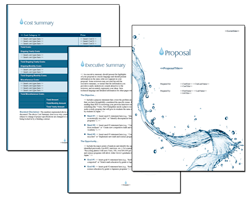
Successful water utility proposals hinge on the involvement of various stakeholders. Public-private partnerships are also crucial, as they combine the strengths of both sectors to achieve common water management goals. Local governments are key players responsible for issuing project RFPs and implementing policies and regulations governing water projects. Community organizations are vital in advocating for local water issues and ensuring public voices are heard in decision-making. Contractors with technical expertise are essential for executing the projects outlined in these proposals.
Addressing the diverse needs of stakeholders through clear communication is fundamental to the success of any water utility project.
Responding to a Request for Proposal (RFP)
Responding to an RFP in the water sector requires meticulous planning and alignment with government priorities and regulations. Conducting a feasibility study can provide valuable insights into the project's viability and help align it with government priorities and regulations. These proposals must clearly outline project deliverables, stakeholder engagement strategies, and compliance requirements to meet the criteria set forth by local, city, or federal governments.
Grasping the nuances of the RFP process can significantly improve the chances of your proposal being selected.
Analyzing the RFP Requirements
Grasping the rules and requirements outlined in an RFP is vital for creating a successful proposal. Pay close attention to the technical specifications outlined in the RFP to ensure your proposal meets all necessary criteria. Failure to comply with these requirements can lead to disqualification, making thoroughly reviewing the RFP document essential.
This detailed review can also reveal specific evaluation criteria that may influence the selection process, allowing you to tailor your proposal accordingly.
Once you have determined what topics must be covered in the proposal, you can use the Proposal Kit to build a template matching the RFP requirements.
Gathering Relevant Materials
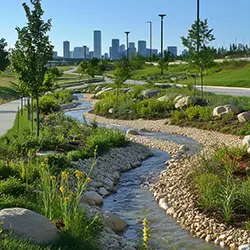
Collecting all relevant materials is critical in writing a comprehensive water utility proposal. An environmental impact assessment can provide crucial information on the project's potential effects on the surrounding environment. Essential documentation such as project plans, budget estimates, and historical performance records bolster the credibility of your proposal. Budget estimates should reflect realistic financial planning and incorporate potential contingencies to demonstrate thorough preparation.
Historical performance records can provide evidence of your capability and reliability in executing similar projects, further strengthening your proposal.
Creating a Winning Proposal
To create a winning proposal, communicate your understanding of the project goals and present a clear, structured implementation plan. Incorporating a sustainability plan can demonstrate your commitment to long-term environmental and economic viability. Highlighting unique project features and the bidder's relevant experience can differentiate your proposal from competitors.
Align your proposal with the evaluation criteria to make it a strong contender in the selection process.
Essential Components of a Water Utility Proposal
Water utility proposals are critical in addressing water quality challenges and ensuring sustainable water management. They are essential for securing funding and supporting projects that enhance water quality and accessibility.
Incorporating a risk management strategy can help identify potential challenges and outline measures to mitigate them.
Proposals in the water sector should address the interconnected nature of water issues and their broader impacts on communities. Incorporating a holistic view of these issues can enhance the proposal's impact, demonstrating a deeper understanding of the socio-economic factors.
Structure of a Water/Wastewater Utility Proposal
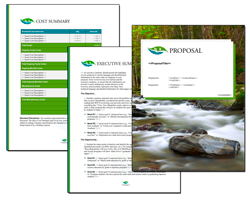
The basic proposal structure is the same whether your business sells services, sells products, pitches an internal company project, or even asks for funding to grow your business.
Here's the order your proposal sections should follow: 1) introduce yourself, 2) summarize the prospective client's needs, 3) describe your products, services, and costs, and finally, 4) provide information about your organization, your credentials, and your capabilities.
Executive Summary
The executive summary serves as an engaging overview that captures the essence of the water utility proposal. Include a project timeline to provide a clear critical milestones and deliverables schedule. It should emphasize the proposal's potential impact and alignment with stakeholders' values and objectives. Clear, specific project goals that are measurable, attainable, relevant, and time-bound (SMART goals) should be outlined.
Include budget considerations, detailing costs for materials, labor, and equipment to provide a clear financial view of the project. Also, highlight compliance with local, national, and international regulations.
Project Objectives and Scope
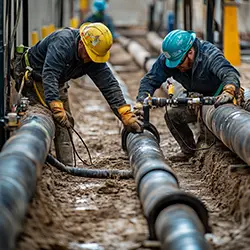
Defining the project objectives and scope is essential to any water utility proposal. Performance metrics should be defined to measure the project's success and impact. Objectives should align with Sustainable Development Goals (SDGs) relevant to water management, enhancing their appeal to specific audiences.
The scope should outline the geographical area and specific communities impacted by the project, clarifying the issues it addresses and the expected impact on the community. Delineating project deliverables ensures stakeholder expectations are met throughout the project's lifecycle.
Budget and Financial Plan
Accurate financial estimates and budgeting are essential to creating a viable water utility proposal. Conducting a cost-benefit analysis can justify the financial investment and demonstrate the project's value. A detailed budget and financial plan provide a roadmap for the successful execution of the project.
Tools like the quoting database within the Proposal Kit can help present financial details accurately. Identifying various funding sources is essential for covering the costs outlined in the budget.
Here are some related samples included in every downloadable Proposal Pack
Here are some related downloadable templates
- CCTV Inspection of Sewer Proposal
- Clean Water Management Proposal
- Clean Water Supply Project Proposal
- Equipment Operation and Maintenance for Water Production Proposal
- Green Stormwater Infrastructure Design Services Proposal
- Lift Station Refurbishment Construction Proposal
- New Water Wells Project Proposal
- Stormwater Facility Low Impact Development Proposal
- Supply and Application of Calcium Chloride Proposal
- Wastewater System Improvements Proposal
- Wastewater Treatment Plant Signage Upgrade Proposal
- Water Meter Reading Services Proposal
- Water Treatment Plant Project Proposal
- Water Treatment and Sanitation Project Proposal
- Waterline Cathodic Protection Program Proposal
Ensuring Compliance and Quality
Following established guidelines in the water sector is crucial for delivering safe water and maintaining quality standards. A comprehensive infrastructure development plan is essential for addressing both current challenges and future needs. A water utility proposal should include a comprehensive capital planning process to identify and prioritize project resource allocation.
It should also encompass a strategy that addresses current challenges and future infrastructure needs, ensuring long-term sustainability.
Regulatory Compliance
Regulatory compliance is a cornerstone of any water utility proposal. Regular compliance audits help ensure adherence to regulatory standards and identify areas for improvement. Utilities must stay updated with frequently changing regulations to avoid compliance issues.
The America's Water Infrastructure Act requires community water systems to conduct risk assessments and emergency plans and certify them to the EPA every five years. Developing a water safety plan is essential for assessing and managing water quality from source to end user.
Quality Assurance Processes

Quality assurance in water utilities involves implementing policies and procedures to guide staff on regulatory compliance. Implementing a continuous improvement process can help identify and address quality issues proactively. Conducting compliance audits helps utilities assess their adherence to necessary laws and identify areas for improvement.
Continuous monitoring systems for water quality ensure compliance with health standards and help identify trends that may require corrective action.
Using Proposal Kit for Water Utility Proposals
Proposal Kit is a powerful tool for creating business proposals, quotes, plans, and contracts, with content tailored specifically for the water sector. Effective document management is crucial for organizing and accessing proposal materials efficiently. With over 28 years of use, Proposal Kit offers a range of customizable templates, design themes, and layouts designed for water utility proposals.
It provides a one-time license fee with no ongoing subscription fees, making it economical for small and large businesses. Proposal Kit can be downloaded and installed on up to five computers, offering flexibility and easy access.
The cost of the Proposal Kit is equivalent to obtaining the documentation and submission fees for a single government bid, and it can be used for unlimited proposals at no extra cost.
Features and Templates
Proposal Kit provides users a structured library of templates tailored to various aspects of clean water projects. It offers a variety of customizable templates to suit different project needs. These templates can be modified in content, design, and format to meet specific project needs. The document assembly feature allows for quick compilation of multi-section proposals from various templates, streamlining the proposal creation process.
Additional features such as automated quotes, schedules, financials, AI assistance, mail merge, custom branding, and document assembly further enhance its usability.
Case Studies and Success Stories
Case studies highlight how users have successfully secured funding through proposals written with Proposal Kit, showcasing its effectiveness. Client testimonials show how Proposal Kit has helped users secure financing and contracts. Users have reported significant success securing funding and contracts using Proposal Kit templates that effectively communicate project goals and benefits.
Success stories illustrate the real-world impact of Proposal Kit on enhancing proposal quality and winning contracts, demonstrating its value in the proposal writing process.
Proposal Kit has hundreds of customer reviews and recommendations.
Best Practices for Effective Proposal Writing
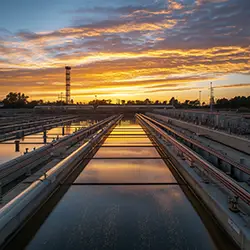
Using practical strategies and clear structures can significantly enhance the impact of water utility proposals. Implementing a thorough proposal review process can help identify and correct errors, improving the overall quality of the submission. Proposal Kit streamlines the proposal writing process, making it easier for users to create customized documents tailored to water utility projects.
Effective structuring enhances a proposal's clarity and persuasiveness. By following best practices, you can ensure that your proposals are engaging, clear, and impactful.
Clear Communication
Effective communication requires clear message conveyance and ensuring the audience feels acknowledged and understood. Effective stakeholder engagement ensures that all parties are informed and involved in the proposal process. Using straightforward language improves understanding and retention of information among stakeholders.
Clear and effective communication is crucial for engaging stakeholders in the proposal process, helping them gain support and complete the project successfully.
Tailoring Proposals to the Audience
Understanding your audience's interests and needs is crucial for crafting relevant and engaging proposals. Conducting an audience analysis can help tailor the proposal to address particular interests and concerns. Understanding the specific interests and concerns of the target audience can lead to more relevant and impactful proposals, ensuring your message resonates with them and addresses their priorities.
Reviewing and Editing
A thorough review process is essential to eliminate errors and improve the overall professionalism of the proposal. Meticulous proofreading is also necessary to ensure the proposal is error-free and presents a professional image. It helps eliminate errors that could undermine the professionalism of the proposal. Ensuring your proposal is error-free enhances its professionalism, making it more persuasive to stakeholders.
 Proposal Kit Professional provides the most content, including legal contracts and a free design theme pack. Plus, advanced software features include custom branding and customizable quoting databases.
Proposal Kit Professional provides the most content, including legal contracts and a free design theme pack. Plus, advanced software features include custom branding and customizable quoting databases. Proposal Pack for Any Business covers this type of proposal and includes samples. There are also some commonly used specialty design themes available:
Proposal Pack for Any Business covers this type of proposal and includes samples. There are also some commonly used specialty design themes available:Photo Design Proposal Packs
Line Art Design Proposal Packs
Summary
In summary, writing a winning water utility proposal involves understanding different types of proposals, identifying key stakeholders, responding to RFPs, and ensuring compliance and quality. Tools like Proposal Kit can streamline the proposal writing process and enhance the quality of your submissions. Following best practices, you can create compelling proposals that secure funding and support for essential water projects. Clear communication, thorough planning, and attention to detail are critical to successful proposals. Let your proposals tell a story that resonates with stakeholders and advocates for sustainable water management.
Frequently Asked Questions
What are the main types of water utility proposals?
The main types of water utility proposals are clean water supply initiatives, wastewater management systems, and emergency watershed protection projects. These proposals aim to ensure sustainable water management and protection of resources.
Who are the common stakeholders in water utility proposals?
Local governments, community organizations, and contractors overseeing project implementation are common stakeholders in water utility proposals. Engaging these groups is essential for successful project outcomes.
Why is it essential to align proposals with RFP requirements?
Aligning proposals with RFP requirements is essential, as non-compliance can result in disqualification and may significantly impact your chances of being selected based on evaluation criteria. It's a critical factor in presenting a competitive proposal.
What features does Proposal Kit offer for water utility proposals?
Proposal Kit provides customizable templates, automated quotes, schedules, financials, AI assistance, mail merge, and document assembly to enhance water utility proposals. These features streamline the proposal process and improve efficiency.
How can reviewing and editing improve a proposal?
Reviewing and editing a proposal significantly enhances its professionalism and persuasiveness by eliminating errors and improving clarity. This ultimately increases the likelihood of gaining stakeholder approval.



 Cart
Cart
 Are you just looking for a template, sample, or software for your water/wastewater utility proposals? Click these links to skip down the page and get right to it.
Are you just looking for a template, sample, or software for your water/wastewater utility proposals? Click these links to skip down the page and get right to it.












 Facebook
Facebook YouTube
YouTube X
X Search Site
Search Site